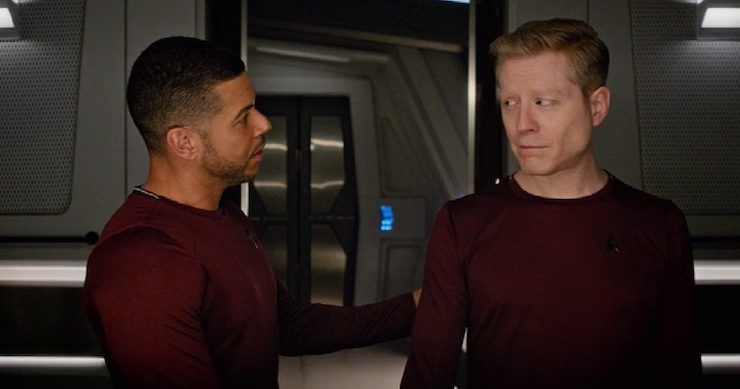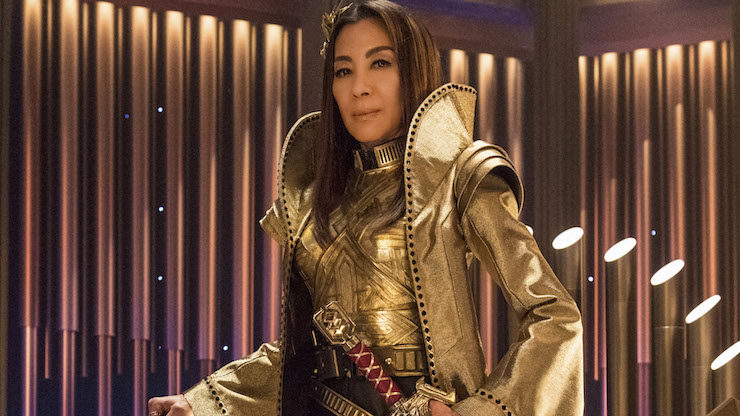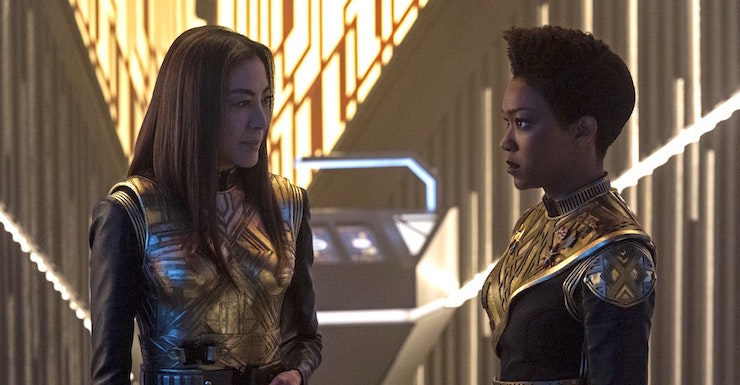Spoilers and Queer Diatribes Below.
I’m still not sure how I feel about Star Trek: Discovery at the close of this first season. I’m not alone in that: in a season filled with excellent performances, rushed narrative arcs, peculiar (and sometimes predictable) choices, and a criminal neglect of the Klingon politics that the first two episodes primed us to look for, it’s hard to know which side of the scales is more heavily weighted.
I want to be able to point to the things that Discovery did well—its choice to focus on Michael Burnham (a character given vivid life by Sonequa Martin-Green’s amazing performance), its willingness to populate the bridge of the Shenzhou and then the Discovery with white women and people of colour, its willingness to take seriously a man as the victim of sexual assault and torture, its decision to interrogate the Federation’s utopian ideals, its choice to put women in positions of power as Admiral Cornwell and Captain Georgiou, its choice to give us a loving gay couple—but with the exception of the tight focus on Burnham, the show’s background visual (human) inclusivity, and its choice to show (as Star Trek has been known to do before) women in positions of power, I find I have some questions about its choices.
I’m going to focus on my questions about the show’s approach to queerness. Because of all of Discovery’s creative decisions, its treatment of its queer characters is the one that left a bad taste in my mouth.

Scientist and lieutenant Paul Stamets (Anthony Rapp) is lover and partner—husband—to medical officer Dr. Hugh Culber (Wilson Cruz). One of Discovery’s episodes has Stamets tell Burnham in deeply moving terms about how he met Culber and fell in love. Their relationship is charming in its domesticity—we see them cleaning their teeth together, for crying out loud—and touchingly real.
Until Ash Tyler, really a split personality with the Klingon spy and torchbearer Voq, snaps Culber’s neck.
Culber reappears to Stamets as a ghost in the fungus-powered multi-universe network that the Discovery has been using for instantaneous travel, but he’s dead. It’s a classic case of buried gays, and in light of The 100’s third season, I find myself disinclined to give any showrunners the benefit of the doubt when they make reassuring noises these days.
Bury Your Gays is a pernicious trope. And speaking of pernicious tropes, how about some evil bisexual action? Bringing Michelle Yeoh—an amazing actor, and mesmerising here—back as Mirror Universe Emperor Georgiou was a stunning and compelling decision, one that forces Burnham to confront, in essence, the brutal, twisted ghost of her beloved mentor. Burnham isn’t going to get a second chance with a different version of Georgiou: she’s going to have to live with her betrayal of her mentor and of her mentor’s Starfleet ideals, because this Georgiou is a ruthless, genocidal, human-supremacist tyrant who keeps slaves and eats sentient beings.

(She’s also stylish as hell and enormously entertaining to watch: Yeoh is so good—and so obviously having so much fun—at playing terrifying and ruthless that I can’t feel bad about enjoying watching her so much. That’s art.)
But Emperor Georgiou is also the only bisexual person that Discovery explicitly shows us: taking a male and female pair of sex workers to bed while (it seems) patiently waiting for the right time to blow up a planet. Compelling as Yeoh is to watch, this is an old, unpleasant trope to see repeated here. Bisexuality doesn’t necessarily mean sexual voracity, and it isn’t a sign of moral depravity either, but honestly, you wouldn’t know it from Star Trek’s history. Or, to be honest, the history of television in general: but coming on top of a Buried Gays incident as it does in Discovery, it has a particular sting.
For all that Discovery thrilled me, it disappointed me in equal measure. It can do better. It should do better.
It doesn’t have any excuses not to.
Liz Bourke is a cranky queer person who reads books. She holds a Ph.D in Classics from Trinity College, Dublin. Her first book, Sleeping With Monsters, a collection of reviews and criticism, is out now from Aqueduct Press. Find her at her blog, where she’s been known to talk about even more books thanks to her Patreon supporters. Or find her at her Twitter. She supports the work of the Irish Refugee Council and the Abortion Rights Campaign.










